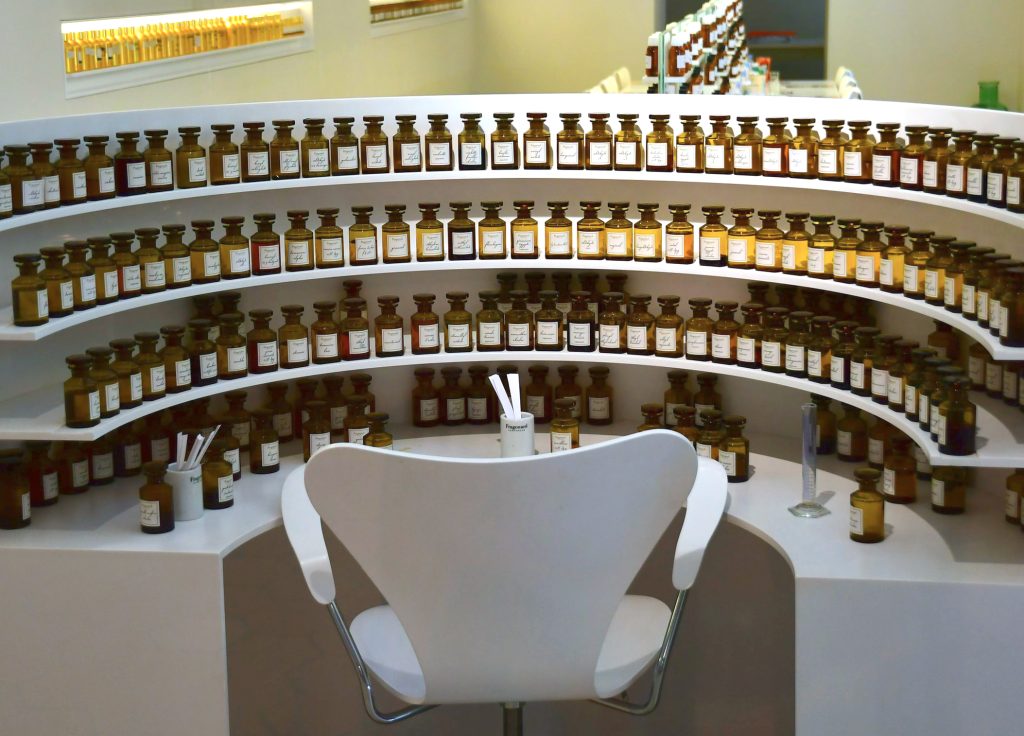Of all our five senses the one of smell is the most powerful one. Scents go straight to our limbic system in our brain and therefore trigger certain emotions and feelings. That is to say, perfumes link directly to memories. On a daily basis you can find them in cosmetics, diapers and your daily skincare routine. With scents being so present in our life, we better take a step back and discover perfume’s true colours. We want to dive deeper into both natural and synthetic fragrances to see how they’re made and how they impact our health and our planet.
Are natural fragrances safer than synthetic ones?
Let’s spend few words on the adjective “natural” and its definition. We sometimes prefer one product over another just because the label states that it comes from unspoiled nature, such as essential oils and floral extract. Natural scents are indeed a combination of similar ingredients. However, companies that claim to sell “100% organic products” often forget how relative such a concept can be. That is to say our understanding of “organic” may differ from the companies’ understanding. In fact, the term “natural ingredients” often indicates elements that preserved more than 50% of their natural composition after being processed. Fertilisers and pesticides also play an important role when talking about the cultivation of organic components.
On the other hand, synthetic fragrances are composed of a vast palette of man-made materials. The ingredients used either derive from petroleum, or they can start as naturals and be modified afterwards. A synthetic fragrance may present no natural ingredients in it or just a combination of some.

There are benefits aplenty when using synthetic fragrances. In fact, they are not susceptible to climate changes, therefore companies can always recreate and sell them. Moreover, synthetic aromas also achieve notes that do not occur in nature.
However, natural scents are famous for changing notes according to the skin they make contact with. This adds value to the scent, because it makes the customer feel unique, a feature that man-made perfumes rarely happen to present. At the same time the lack in the durability of organic aromas still represents a huge obstacle to overcome.
We are what we breathe
Learning that the word “natural” does not always mean safe is just the beginning of your sweet-smelling journey to a better understanding of the beauty industry. On a daily basis perfumes can be loyal alleys for covering unpleasant smells, but they can easily become our worst nightmare on the long run. Even though in different ways, both man-made and natural scents can be dangerous for our planet. The former might include chemicals that make it easier for toxic elements to be absorbed by aquatic plants and animals. The latter’s process of picking scents from trees instead is one of the main causes of deforestation. The process might also include the extraction of scents from animals.
Better to stink than to sneeze
We all surely know at least one friend that happens to be extremely sensitive to scents. However, we rarely ask ourselves why our body reacts to them the way it does.
Many different products we use on a daily basis, such as cosmetics and cleaners, contain ingredients that can cause both skin and respiratory allergies. We can find some of the elements that trigger allergic reactions in natural as well as synthetic perfumes. Lavender extract (mostly used to cover cleaners with a strong and unpleasant smell) is just one of the many ingredients that can trigger an allergic reaction.
Recent studies have also listed some harmful chemicals you can find in fragrances of any sort. Two main examples are Benzophenone and Acetaldehyde, chemicals suspected to cause cancer.

Let’s cut fragrances some slack
Scientific researches might expose an ugly truth about what really hides behind the term “fragrance”. However choosing a perfume that really suits you and doesn’t affect your health is not that hard. You can easily prevent any kind of damage by being more careful while purchasing a scent.
Here are 5 tips and tricks you can take into account during your next purchase:
1. Be aware of your allergies. Talking to an expert can help you discover them so that you can avoid them afterwards. If you have many allergies, an air purifier may be a solution for you. When talking about skincare, consider choosing products with no fragrances in it
2. Don’t forget that both synthetic and natural fragrances have positive as well as negative features. That is to say that selecting one of the two depends on your personal needs
3. Read labels and avoid products that include no information other than “fragrance” on their ingredients list
4. Reduce your own environmental impact by choosing to shop for sustainable brands
5. Look for companies that are as clear and transparent as possible. Search for brands and companies that truly avoid harmful chemicals and declare themselves as vegan





